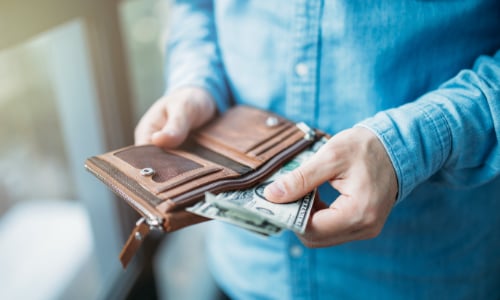
- If You Can't Afford it Without a Credit Card, Don't Buy it
One of the most dangerous approaches to having a credit card is living under the illusion that you can afford things you actually do not have the money to afford. One good rule to live by is if you can't pay for something in cash, then you can't afford it with a card. - Have an Emergency Fund
Emergency savings are very important for those “just-in-case” situations. Best practice when trying to establish an emergency savings is to have at least six-months of your salary saved up.This will be something to cover your expenses if you lose your job, have an injury that prevents you from working, or for when you need money for an unexpected, but necessary, cost. - Pay Off Your Credit Card Balance in Full to Stay in Control of Your Spending
After making a purchase, try paying it off quickly before other things come up. This helps you avoid interest and keep your finances on track. Set up automatic payments so you never miss a bill. - Cut-Out the Wants, Focus on the Needs
There's always room in your personal budget to cut out unnecessary spending habits. This could be going to “Taco Tuesday” at your favorite restaurant only once a month, or cutting down on your online shopping. The more you shave away the wants and spend only on the needs, the better your finances will be. - Everything's Better With a Budget
By budgeting out your monthly expenses you can better track where your money is going and where you can afford to spend it. Every month, parcel out how much to put in savings, your 401(k), and how much extra you have left to spend on the necessities. So if the time ever comes where you need to do a major cut down of your expenses you will know exactly what to cut. Handy online tools, like Money Manager or a budget calculator can help you with a budget and automate some of the budgeting process for you. - Do Not Use Your Credit Card for Cash Advances
If you need to use your credit card in order to have cash on hand, that is a sign that you are abusing your finances. Not only is the APR higher than regular purchases, but you'll likely also be charged a fee. - Limit The Number of Credit Cards You Have
Multiple credit cards mean multiple payments and multiple cases of tacked on interest. This is a setup for the eventual need of debt consolidation if you cannot handle using the cards responsibly. The more charges accumulated on each card means more room to lose track of your spending and payments. - Stay on Top of All Your Accounts
Update your financial plan monthly to ensure you make full payments on time. Tools like Money Manager give you a clear view of your finances, including accounts, credit cards, loans, and investments, even if they’re with different institutions. - Use New Income to Grow Your Savings
If you receive a pay increase, consider continuing to live on your previous wage and saving the additional income. After all, you've already proven you can live comfortably on your previous wage. Put the new funds in a place where they will work harder for you. Spend less than you earn and avoid spending unnecessary money just because your income grew. - Make Coupons a Budget Essential
Saving on everyday essentials like groceries leaves more room in your budget to avoid debt. Start by exploring clearance and discount sections when you shop. These areas often offer quality products at reduced prices as stores clear out older inventory to make way for new seasonal stock.
The hardest part in trying to avoid debt is limiting yourself. Spending has become one of the most popular temptations in today's society. Through these strategies you can cut-down on potential debt all the while still having room left in your budget for yourself!